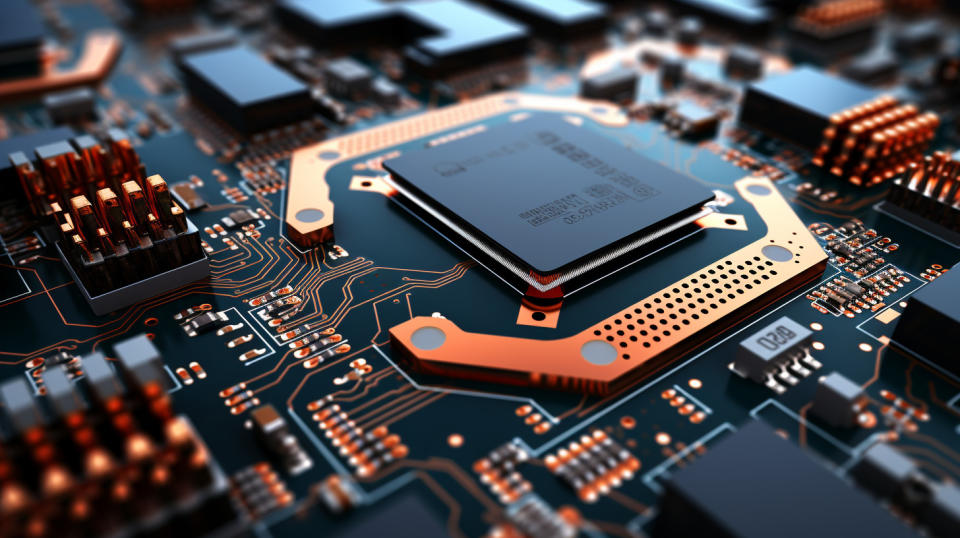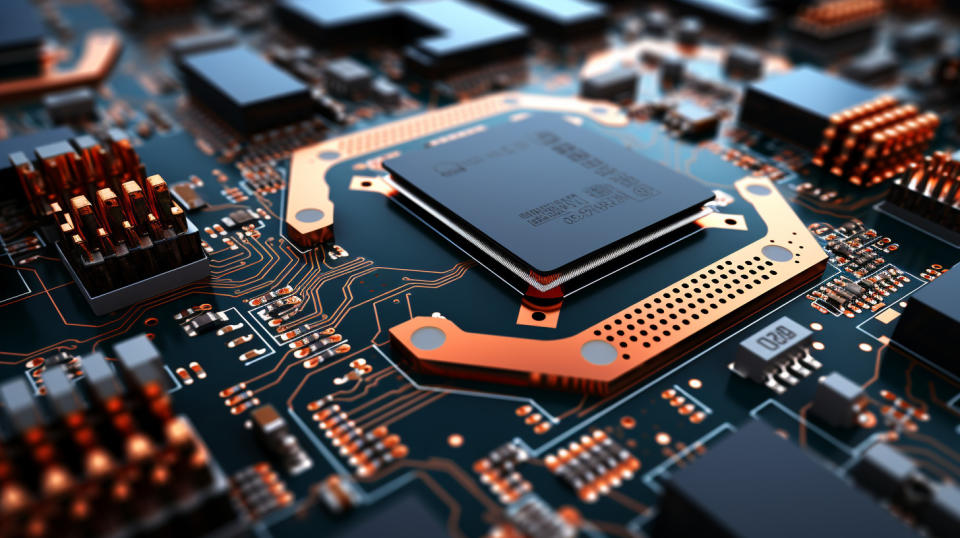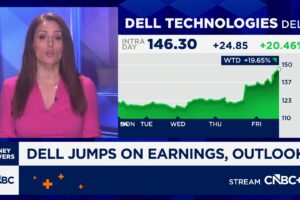We recently compiled a list of the 10 Best AI Stocks to Buy According to Reddit. In this article, we are going to take a look at where Advanced Micro Devices, Inc. (NASDAQ:AMD) stands against the other AI stocks.
As artificial intelligence becomes more prevalent in current world affairs, new patterns concerning its research and development strategies are also emerging. Traditionally, academia has focused on basic research and education, while industry concentrated on applied research and commercialization. However, in recent years, the commercial sector’s dominance in AI investment and research has raised concerns about the balance of power. The shift of researchers from academia to industry has also raised questions.
Advanced AI systems increasingly require large amounts of data, compute power, and funding resources that industry actors possess in greater quantities than academia and nonprofits. Hence, AI research, which was originally the domain of academia in the early 2000s is now being taken over by industry.
We recently talked about this division in another article we published, 7 Most Popular AI Penny Stocks Under $5, here’s an excerpt from it:
“A recent study from Stanford University found that businesses train AI models faster than academic institutions. In 2023, the industry-trained AI neared 51 significant machine learning models, while academia managed only 15. This trend persisted in 2024 despite rising training costs. ChatGPT 4, the latest model of ChatGPT, cost about $80 million to train. Google’s Gemini Ultra cost around $191 million.”
A 2021 Stanford report says that the reason behind the blurring roles of academia and industry is that businesses come with affordable cloud computing, open-source libraries, and pre-trained models that incentivize university researchers to pursue commercial applications of their work. More and more industry papers are now appearing at conferences, raising concerns about applied research stifling long-term innovation or being biased toward corporate interests, all while also accelerating solutions for real-world problems.
A 2023 paper in the journal Science states that businesses attract 70% of the top talent with PhDs in AI today, as compared to just 20% 2 decades ago. The number of AI research faculty in academia has stagnated, while industry hiring has surged 8 times since 2006. Industry models being substantially larger (about 29 times), indicating superior computing power, is a huge reason behind this.
In 2021, US government agencies allocated a total of $1.5 billion for academic AI research, while Google spent the same amount on a single project in just one year.
The largest AI models are now developed in industry 96% of the time. Leading benchmarks are also primarily industry-driven, accounting for 91% of the total. Furthermore, the number of published papers with industry co-authors has nearly doubled since 2000.
Yet, there’s another anticipated shift as academic researchers are increasingly able to deploy their inventions in real-world settings. Duolingo, a language learning app developed by academics, is a successful example.
A distinguished MIT professor, Frédo Durand, believes academia can still be a driving force for innovation. He says that 25 years ago, the field of computer graphics in academia faced a similar resource imbalance where the industry created stunning visuals that academia couldn’t match. However, instead of trying to mimic industry, academia took a different path and focused on ideas like advanced lighting simulations, fluid dynamics, and machine learning for animation. These seemingly outlandish ideas eventually became the foundation of modern rendering and graphics hardware.
Durand believes this approach holds valuable lessons for AI research. He emphasizes the importance of academia pursuing unconventional approaches, openly sharing their work, and maintaining a sense of excitement about the field.
However, he recognizes the challenges for academia and suggests potential solutions including increased government funding for academic research, shared research infrastructure, and strategies to keep top AI talent within academia. While industry seems to be taking over AI in general, collaborative partnerships with academia could yield better results. In one way or the other, AI will remain a hot topic in the coming times.
Methodology
To compile our list, we sifted through several active subreddits to compile a list of 15 AI stocks to buy. We then selected the 10 stocks that were the most popular among elite hedge funds and that analysts were bullish on. The stocks are ranked in ascending order of the number of hedge funds that have stakes in them, as of Q2 2024.
Why are we interested in the stocks that hedge funds pile into? The reason is simple: our research has shown that we can outperform the market by imitating the top stock picks of the best hedge funds. Our quarterly newsletter’s strategy selects 14 small-cap and large-cap stocks every quarter and has returned 275% since May 2014, beating its benchmark by 150 percentage points (see more details here).

A close up of a complex looking PCB board with several intergrated semiconductor parts.
Advanced Micro Devices, Inc. (NASDAQ:AMD)
Number of Hedge Fund Holders: 108
Advanced Micro Devices, Inc. (NASDAQ:AMD) is a major semiconductor company that designs and manufactures microprocessors, graphics processing units (GPUs), and other computing components, and is known for its competitive products in the gaming and high-performance computing markets.
Advanced Micro Devices, Inc (NASDAQ:AMD) impressed Wall Street with Q2 results, where the data center revenue in the period grew 49% year over year. Overall revenue growth was 8.88% for the quarter, recording a total revenue of $5.84 billion. This was $113.81 million higher than estimates. Ryzen CPU sales increased 49% over the year. Gaming revenue declined 59% due to decreased PlayStation and Xbox sales, but Radeon 6000 GPUs saw a year-over-year sales increase.
The 2023 launch of its Instinct™ MI300 Series accelerators, designed for AI and HPC workloads, is still a major contributor to the company’s growth. This chip competes with Nvidia’s H100 AI chip. The company now plans on releasing new AI chips annually, including the MI325X by the end of 2024, the MI350 in 2025 (a competitor to Nvidia’s Blackwell), and the MI400 in 2026.
Dan Ives of Wedbush believes that the company’s strong results and AI investments suggest a promising future in the AI market. He expects it to benefit significantly from the growing AI spending, which is estimated to reach $1 trillion over the next few years. Investors seem to follow the same opinion, as 108 hedge funds held long positions in this company by June 30. Fisher Asset Management had the largest stake, valued at $3,755,355,818.
Meridian Contrarian Fund stated the following regarding Advanced Micro Devices, Inc. (NASDAQ:AMD) in its fourth quarter 2023 investor letter:
“Advanced Micro Devices, Inc. (NASDAQ:AMD) is a global semiconductor chip maker specializing in central processing units (CPUs), which are considered the core component of most computing devices, and graphics processing units (GPUs), which accelerate operations running on CPUs. We invested in 2018 when it was a mid-cap value stock plagued by many years of underperformance due to lagging technology and lost market hi share versus competitors Intel and Nvidia. Our research identified that changes and investments made by current management under CEO Lisa Su had, over several years, finally resulted in compelling technology that positioned AMD as a stronger competitor to Nvidia and that its latest products were superior to Intel’s. We invested on the the belief that AMD’s valuation at that that time did not reflect the potential for its technology leadership to generate significant market share gains and improved profits. This thesis has been playing out for several years. During the quarter, AMD unveiled more details about its upcoming GPU products for the AI market. The stock reacted positively to expectations that AMD’s GPU servers will be a viable alternative to Nvidia. Although we pared back our exposure to AMD into strength as part of our risk-management practice, we maintained a position in the stock. We believe AMD will continue to gain share in large and growing markets and is reasonably valued relative to the potential for significantly higher earnings.”
Overall AMD ranks 6th on our list of the best AI stocks to buy. While we acknowledge the potential of AMD as an investment, our conviction lies in the belief that AI stocks hold great promise for delivering high returns and doing so within a shorter timeframe. If you are looking for an AI stock that is more promising than AMD but that trades at less than 5 times its earnings, check out our report about the cheapest AI stock.
READ NEXT: $30 Trillion Opportunity: 15 Best Humanoid Robot Stocks to Buy According to Morgan Stanley and Jim Cramer Says NVIDIA ‘Has Become A Wasteland’.
Disclosure: None. This article is originally published at Insider Monkey.









